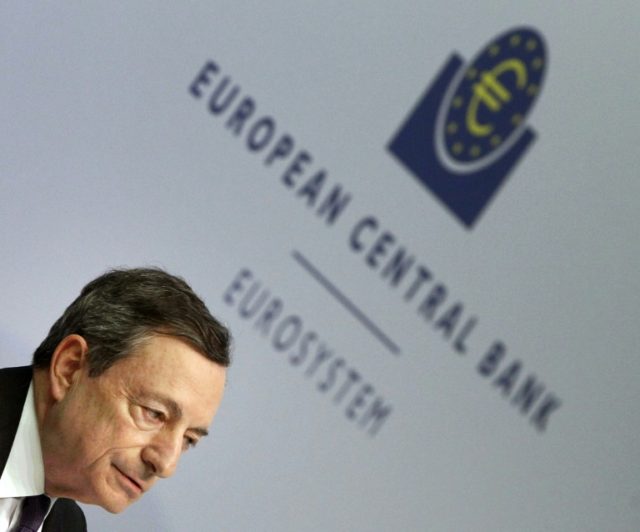Riga (AFP) – The European Central Bank said Thursday it would end in December the mass bond-buying used to buttress the eurozone economy, in a sign of confidence in the outlook for growth and inflation in the bloc.
“After September 2018… the monthly pace of the net asset purchases will be reduced to 15 billion euros until the end of December 2018… net purchases will then end,” a spokeswoman said.
But the governors included a note of caution by making the step “subject to incoming data” showing inflation remains on track.
Central bankers’ bond buys — currently set at 30 billion euros ($35 billion) a month — and ultra-low interest rates are designed to stoke growth in the 19-nation single currency area and power price growth to their target of just below 2.0 percent.
More than three years after President Mario Draghi unleashed the “quantitative easing” programme, policymakers said a review at their meeting in the Latvian capital Riga of economic data and internal ECB forecasts convinced them they were on course to reach the inflation goal.
They looked to reassure observers by promising interest rates will “remain at their present levels at least through the summer of 2019”.
Meanwhile, the ECB will continue to reinvest its massive 2.4-trillion-euro stock of bond holdings “for as long as necessary” to ease access to finance for firms and households in the 19-nation eurozone.
Observers will now look to Draghi to explain the central bankers’ reasoning in greater detail at a press conference.
Thursday’s announcement “is probably a little bolder than markets had expected, but this is tempered by the pledge to keep interest rates on hold for more than a year,” Capital Economics analyst Jennifer McKeown commented.
The euro slid immediately following the announcement, falling from $1.1818 to $1.1737 around 1220 GMT — down 0.5 percent on the day.
“President Draghi will be quizzed about the decision to take a big step towards normalising policy at a time when markets are still nervous about Italy and the eurozone economy appears to be weakening,” McKeown added.
The exit from QE comes at a moment when the eurozone appears slightly winded after a string of positive economic news in 2017.
Growth has slowed in early 2018 compared to late last year — 0.4 percent between January and March compared with 0.7 percent in the previous three months.
Meanwhile, eurozone price growth surged to 1.9 percent in May, in line with the ECB’s target.
“Core” inflation discounting the most volatile elements remains weak, but the data suggest that QE has dispelled the risk of deflation, or a downward spiral of prices braking economic activity.
– Litany of threats –
While the ECB’s move is more definitive than some had expected, economist Frederik Ducrozet of Pictet bank highlighted via Twitter that its commitment to “tapering” or winding down bond purchases is “not an ironclad one”.
In their statement, governors made their reduction in bond purchases “subject to incoming data confirming the governing council’s medium-term inflation outlook.”
They are “retaining some flexibility, although the bar for policy change is arguably very high,” Ducrozet wrote.
ECB chiefs may have felt the need for a fallback option when casting an eye over the long list of threats to the eurozone expansion.
The dangers range from the new Italian government’s unpredictable spending policies, which could pitch the bloc’s third-largest economy into a financial crisis — although fears for the sustainability of Italy’s debt mountain have calmed since Economy Minister Giovanni Tria ruled out an exit from the euro Sunday.
Elsewhere, the prospect of a failure to reach a Brexit deal with London remains as real as ever.
And an acrimonious end to Saturday’s G7 summit heightened the risk of a tit-for-tat trade war between EU nations and US President Donald Trump, while higher oil prices could weigh on future growth.
“The macro(economic) environment has become anything but more solid” since governors’ last meeting in June, ING Diba bank analyst Carsten Brzeski judged.
That made today’s decision “a truly Solomonic compromise” between hawks eager to end support for the economy and doves fearful of undermining the expansion.
“The hawks finally got their end-date for QE, while the doves still have their open door for more if needed,” Brzeski said.
“Nicely done,” he said.

COMMENTS
Please let us know if you're having issues with commenting.